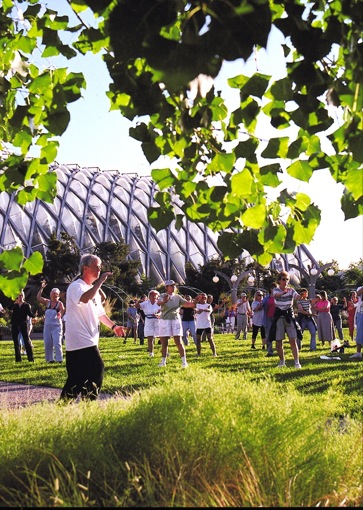City Park Tai Chi and Fitness Walks
Offered free to the public in City Park monthly, the gathering will feature a Tai Chi lesson, fitness walk with Walk with A Doc, featuring selected health topics with visiting health experts and allow for information to be distributed by local businesses that wish to enhance their brand, reach target audiences and foster goodwill in the community.
where are we?
Southwest corner of City Park in Denver, by Thatcher Fountain. If the entrance off 17th Ave is locked, park along the Esplanade in front of East High School and walk on over!
Reach out
- Phone: +1 303 744-7676
- Email: taichiproj@earthlink.net
Our hours
- Saturdays 8am


Register
About the Project
The COVID-19 pandemic has severely impacted the health of individuals, and small businesses which are key to the health of our communities and the local economy. When small businesses and communities share goals for better health, we create a healthy environment and a better quality of life for the whole community.[i] This project will create a series of weekly community engagement activities promoted cooperatively with local small businesses providing physical activity opportunities, balance and fall prevention training, and improve health promotion for older adults and underserved populations in the central Denver area.
Offered free to the public in City Park each weekly meeting will feature a Tai Chi lesson, fitness walk, and selected health topics with visiting health experts and allow for information to be distributed by local businesses that wish to enhance their brand, reach target audiences and foster goodwill in the community. The program will be marketed by EDDM mailings, e-mail newsletter, Facebook, Meetup, flyers, and posters distributed at local businesses, coffee shops, physicians’ offices, libraries, recreation centers, in addition to regular press releases, and calendar submissions. The resulting promotions will help drive increased foot traffic and economic activity in surrounding neighborhoods and along the Colfax Avenue business corridor.
The project will begin in late October 2022 and continue weekly til September 2023. These efforts should become systemic over time and morph into a culture of health, safety, and well-being in the community. The program will be open to all, with the primary audience being older adults and underserved populations. The project will recruit businesses along the East Colfax business corridor and surrounding areas that meet the required DNRI of .89, including City Park West (.85), City Park (.88), Capitol Hill (.85-.87), North Capitol Hill (.81-.83), Congress Park (.88), and Cheeseman Park (.89). To achieve the stated goals this project has three aims:
Aim 1 – Establish and implement a free weekly health promotion program in City Park
Physical inactivity leads to obesity, cardiovascular disease, and osteoporosis dramatically increases the risk of falls in older adults, and is a factor in many other chronic diseases and conditions. The problems created by a lack of physical activity are only going to get worse. The project will provide community engagement activities to improve:
Physical Activity Levels: Physical activity has been shown to affect multiple risk factors for many diseases improving bone health, cardiopulmonary fitness, physical function, general quality of life, immunity, anxiety, depression, and self-efficacy.[ii].[iii] Traditionally ranked as one of the most physically active cities in the country Denver has fallen during the pandemic to 9th place in the ACSM’s American Fitness Index. Only 51% of Coloradans get the recommended level of physical activity per week and in Denver, 17% get no leisure time physical activity at all. and the problem only gets worse in older adults and underserved populations.[iv]
Improve Balance and Reduce Falls: One in three older adults experience a fall each year, causing significant injury and deaths. Recent figures show that more than 4,500 Denver metro area residents age 65 and older are hospitalized each year with fall-related injuries.[v] Much research has shown that the ancient Chinese exercise of Tai Chi is effective in preventing falls among older adults. Tai Chi is an inherently safe form of exercise and, therefore, an ideal form of exercise and balance training for older adults.[vi]
Improve Health Promotion: With credible and actionable information on health promotion, most illnesses are preventable. This is especially a problem for older adults, lower-income, and minority groups. Quality health education programs have the potential to improve the health and quality of life of the entire community. We will accomplish Aim # 1 by creating and implementing:
- Weekly Tai Chi and Walk with a Doc workshops in City Park: Classes will be held online in cases of inclement weather.
- Dedicated Website and Virtual Health Fair: Local business partners will have opportunities to offer coupons and promotional material about local programs at the event and will be featured prominently on the project’s website.
- Email newsletter: To provide ongoing information about local programs and important health information as well as promotions for sponsoring businesses.
Aim 2 – Community-wide promotion campaign: Partnering with local businesses.
The project will recruit partnerships with small businesses that share our passion for healthy living and wish to be associated with our efforts. Research has shown that it is simply not possible to achieve community health promotion goals without the involvement of local small businesses.[vii] The project will provide promotional opportunities for small businesses to increase their visibility, enhance their brand, and reach target audiences fostering goodwill in the community. Partners will post information about the program at their location and in return they will be able to distribute promotional material, coupons, flyers etc. at the events.
Aim 3 – Targeting older adults and underserved communities in central Denver
Participation in leisure physical activity (PA) interventions among older adults is influenced by socioeconomic status, race/ethnicity, and environment. This project seeks to provide free opportunities to improve health literacy and physical activity for marginalized populations including communities of color, older adults, people experiencing poverty or homelessness, immigrants, people with disabilities, LGBTQ+, veterans, etc. Research demonstrates that older adults from marginalized and disadvantaged populations are at elevated risk of accelerated aging and premature death.
Improving the economic health of small businesses and the whole-person health of individuals within the targeted areas of Denver is the ultimate aim of every aspect of this project. Improved opportunities for physical activity and health education have the potential to improve the health and vibrancy of the entire community. There is a strong relationship between the health of the community and the health of its small business owners. A truly healthy community needs both. Healthy, fully functional people and communities are money in the bank for the whole society.
Program Evaluation
This project will use the RE-AIM framework for program evaluation, measuring: The Reach of the program, Effectiveness, Adoption by small business partners, Implementation, and Maintenance after funding is completed
[i] Small Business, Big Impact: The Untapped Opportunity to Advance Health and Equity, Nov 25, 2019, 10:00 AM, Posted by Rhett Buttle https://www.rwjf.org/en/blog/2019/11/small-business-big-impact-the-untapped-opportunity-to-advance-health-and-equity.html
[ii] Jahnke R, Larkey L, Rogers C, Etnier J, Lin F. A comprehensive review of health benefits of qigong and tai chi. Am J Health Promot. 2010 Jul-Aug;24(6):e1-e25. doi: 10.4278/ajhp.081013-LIT-248. PMID: 20594090; PMCID: PMC3085832.
[iii] 2018 Physical Activity Guidelines Advisory Committee. 2018 Physical Activity Guidelines Advisory Committee Scientific Report. Washington, DC: U.S. Department of Health and Human Services, 2018.
- Physical Activity Guidelines Advisory Committee. Physical Activity Guidelines Advisory Committee Report, 2008. Washington, DC: U.S. Department of Health and Human Services; 2008. https://health.gov/paguidelines/guidelines/report.aspx. Published 2008. Accessed September 22, 2017.
- Arem H, Moore SC, Patel A, et al. Leisure time physical activity and mortality: a detailed pooled analysis of the dose-response relationship. JAMA Intern Med. 2015;175(6):959-967. doi:10.1001/jamainternmed.2015.0533.
- Pacheco, C., Felipe, S., Soares, M., Alves, J., Soares, P., & Leal-Cardoso, J. et al. (2018). A compendium of physical exercise-related human genes: an ’omic scale analysis. Biology of Sport, 35(1), 3-11. https://doi.org/10.5114/biolsport.2018.70746
- Gopinath, B., Kifley, A., Flood, V.M. et al. Physical Activity as a Determinant of Successful Aging over Ten Years. Sci Rep8, 10522 (2018). https://doi.org/10.1038/s41598-018-28526-3
[iv] https://americanfitnessindex.org/wp-content/uploads/2022/05/2022-Fitness-Index_Denver-CO.pdf
[v] https://denverregion.co.networkofcare.org/aging/fall-prevention/index.aspx
[vi] Nyman, S. R., Tai Chi for the Prevention of Falls Among Older Adults: A Critical Analysis of the Evidence, (2020) Journal of Aging and Physical Activity
DOI: https://doi.org/10.1123/japa.2020-0155
[vii] Pronk, N.P., Baase, C., Noyce, J., and Stevens, D.E. (2015) Corporate America and Community Health: Exploring the business case for investment. JOEM, 2015;57(5):493-500.